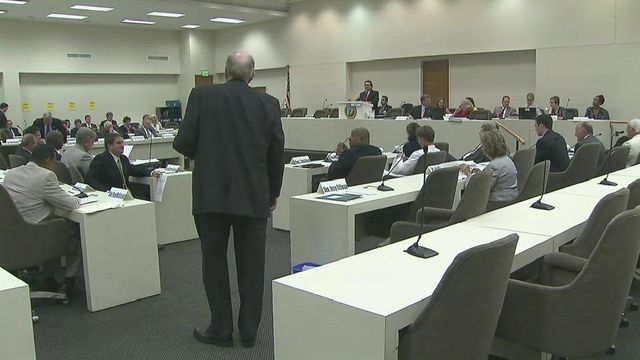Senate tax bill targets Wake, Mecklenburg
A key Senate committee on Tuesday approved a proposal that would limit the power of four large North Carolina counties, including Wake County, to raise sales taxes.
Posted — UpdatedThe measure, House Bill 1224, would make it easier for most counties in the state to raise sales taxes. Sponsor Sen. Rick Gunn, R-Alamance, said changes made Tuesday would allow local leaders more flexibility to raise sales taxes for whatever purpose voters approve.
For four counties, however, the opposite is true.
Under current law, six counties – Wake, Durham, Orange, Mecklenburg, Forsyth and Guilford counties – have the power to ask voters to approve both a half-cent increase for transit and a quarter-cent increase for education, for a maximum of 2.75 percent.
Durham and Orange counties have already enacted both. Their current local rates are 2.75 percent, and the bill would allow them to keep those rates.
But all other counties in the state, including the four other transit-tax counties. would be barred from asking voters to raise the local sales tax above 2.5 percent.
Mecklenburg County, where the local tax rate is already at 2.5 percent because a transit tax is in effect, would have to scrap a quarter-cent increase for schools set to go before voters in November because it would raise the county's rate above the cap.
In Wake County, commissioners are expected to decide Aug. 4 whether to ask voters for a quarter-cent increase for schools this fall. If that increase passes, however, the county would be barred from asking voters for a half-cent transit tax.
Sen. Dan Blue, D-Wake, said Wake County has already entered into an agreement with Durham and Orange counties to raise its sales tax for the development of regional transit.
"They have to go in at a half-percent. That's the contract they're into," Blue said. "So, in effect, you’re telling the state’s second-largest school district that, if you comply with the deal you've made with other counties, then you’re precluded from doing anything for public education."
"Is it the intent in this legislation to put the shaft to Wake County and Wake County alone?" Blue asked.
"It certainly will be their choice if they want to levy the one half-cent for transit," Gunn said. "They’ll have the same options that the other counties have."
"You are targeting four counties in particular on this – four counties that are urban counties that were recognized as having transit needs," protested Sen. Josh Stein, D-Wake. "You’re tying the hands of Wake County."
"We want to level the playing field," Gunn replied. "This 2.5 percent cap is going to be in place and provide some universal appeal to the whole area."
The bill would offer political cover to Republicans on the Wake County Board of Commissioners, who have resisted mounting public pressure since 2011 to put the transit tax before voters.
On Monday, with the Senate proposal in circulation, the county's Republican commissioners changed course on that issue, directing county staff to fast-track transit plans.
The next stop for the legislation is the Senate floor, where it could be debated as soon as Wednesday. The bill would still need the approval of the House.
House finance leaders said Tuesday they were not informed about the bill by Senate leaders and are trying to learn more about the proposal.
Related Topics
• Credits
Copyright 2024 by Capitol Broadcasting Company. All rights reserved. This material may not be published, broadcast, rewritten or redistributed.






